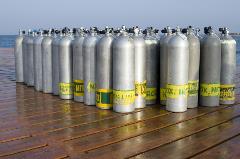More than 60 years ago, when Jacques Yves Cousteau first introduced the concept of exploring the underwater world, viewers watched the Captain and his crew strap on tanks filled with air and the concept of SCUBA (Self Contained Underwater Breathing Apparatus) was born.
A common misconception was that these divers were taking down oxygen tanks, when in reality the tanks contained compressed air. The air that you and I breathe every day is actually a combination of nitrogen and oxygen (21 percent oxygen and 79 percent nitrogen to be exact). When you scuba dive, the longer you stay under the water (bottom time), the more nitrogen your body absorbs.
 If divers absorb too much nitrogen in their blood stream, they develop a condition known as “the bends” (also known as decompression sickness). To help divers reduce the potential for this situation, the dive industry introduced the concept of Enriched Air (or Nitrox) in the late 1990’s. Nitrox is simply a gas mixture that has a higher concentration of oxygen and a lower concentration of nitrogen. If a diver is breathing less nitrogen, the chance of developing the bends is greatly reduced.
If divers absorb too much nitrogen in their blood stream, they develop a condition known as “the bends” (also known as decompression sickness). To help divers reduce the potential for this situation, the dive industry introduced the concept of Enriched Air (or Nitrox) in the late 1990’s. Nitrox is simply a gas mixture that has a higher concentration of oxygen and a lower concentration of nitrogen. If a diver is breathing less nitrogen, the chance of developing the bends is greatly reduced.
For traveling divers, using Nitrox provides several important benefits. These include:
Longer Bottom Times: Depending on a number of factors, by using Nitrox and thus breathing in less nitrogen, you may be able to stay underwater longer. This is sometimes an important factor for divers investing in scuba diving vacations.
Shorter Surface Intervals: Following every scuba dive, divers are required to have a surface interval where their bodies recover and burn off excess nitrogen brought into their system during the dive. This is common and part of the diving experience. When using Nitrox, the surface intervals tend to be shorter because there is less nitrogen to burn off.
More Relaxing Experience: There is no scientific proof, but many divers report that using Nitrox helps them surface feeling more energetic. We guess the only way for you to know for sure is to try Nitrox diving yourself!
All of the major scuba training organizations offer certification in diving Nitrox. For more details, locate and contact your local dive center.